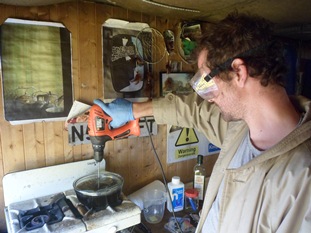At The Big Lemon everything we do is focused on sustainability. From the aims of the business to everything we do on a daily basis, our goal is to reduce both our impact on the environment and that of our community at large.

Here are ten of our main achievements so far:
- Our fuel is sourced locally from waste cooking oil from restaurants in and around Brighton & Hove
- All the rubbish on the buses and from the office is sorted and collected by Brighton Paper Round with the vast majority recycled
- All paper we buy for the office is 100% recycled
- Everything that doesn’t need to be printed on new paper is printed on the back of waste paper from old letters etc
- All our promotional material is printed on 100% recycled paper by A Local Printer
- All our office furniture is pre-loved waste furniture we have acquired from friends, local businesses, the city council and GreenCycleSussex
- We have a compost heap in the depot where we compost all our office food waste and tea bags
- We have a Sustainability Policy January 2015 which we review each year
- We won the Dandelion Award for sustainable business in 2009
- We won “Best Sustainability Initiative” at the 2010 Brighton & Hove Public Service Awards

Our Fuel: Biodiesel from Waste Cooking Oil
All our vehicles ran on recycled waste cooking oil from local restaurants from 2007-2017.
The waste oil is collected from chip shops, restaurants and hotels in Brighton & Hove and across Sussex. It is then processed in a factory near Eastbourne to make biodiesel, a plant-based alternative to regular mineral diesel.
Unlike burning fossil fuels like mineral diesel – which releases carbon dioxide into the atmosphere which had been buried for millions of years – burning plant material only releases the carbon dioxide that the plant had absorbed in the last few years as it grew, not any new emissions in our lifetime. If no one used the oil, it would be sent to our already overstretched landfill sites, which in turn emit another greenhouse gas – methane.
The benefits of biodiesel from waste cooking oil include:
- Approx 75% reduction in carbon dioxide emissions compared with mineral diesel*
- Virtually no sulphur dioxide (a major contributor to acid rain)*
- Lower emissions of carbon monoxide, hydrocarbons and particulates*
- Approx 25% reduction in nitrogen oxides if engine timing is ‘retarded’*
- 79% less waste water and 96% less hazardous solid waste*
- Biodegrades four times quicker than mineral diesel*
- No wars, Arctic drilling or ocean rig disasters required
* Source: “How to make biodiesel”, Low Impact Living Initiative, Winslow 2005




Biodiesel is not an environmentally acceptable fuel at all. It’s use has been criticised for at least 10 years. Interesting that you quote such old research.
What’s more immediate in the present is that you are running your buses with a fuel that has an adverse effect on air quality as we live and (try to ) breathe.
It would be a good idea to get these filthy vehicles off the road at once.
Your sanctimonious mission statement is sickening in more than one sense.
Hi there, thanks for your comments, a bit abusive but in the interests of transparency I’ve tried to address them.
There is a big difference between biodiesel from locally-sourced waste cooking oil (that we use) and the biofuel from crops planted on cleared rainforests and fields that once grew food, which rightly have been discredited.
All biodiesel emissions test results available online show the above emissions data to be roughly accurate; in fact 75% reduction in greenhouse gases is a conservative estimate. The US has done a lot of research on this, and US Department of Energy data from 2010 shows biodiesel from waste cooking oil (‘waste grease’) to be responsible for only 14% of the greenhouse gas emissions of petrol: http://www.afdc.energy.gov/data/10328
The Big Lemon has always emphasised that the benefits of biodiesel are in reduced CO2 emissions, not in air quality, even though biodiesel has much lower levels of particulates and no SO2. We are very aware of the health implications of Nitrogen Oxides and that is why we are trying hard to move to electric buses powered on renewable electricity so we get the best of both worlds: http://thebiglemon.com/electric/